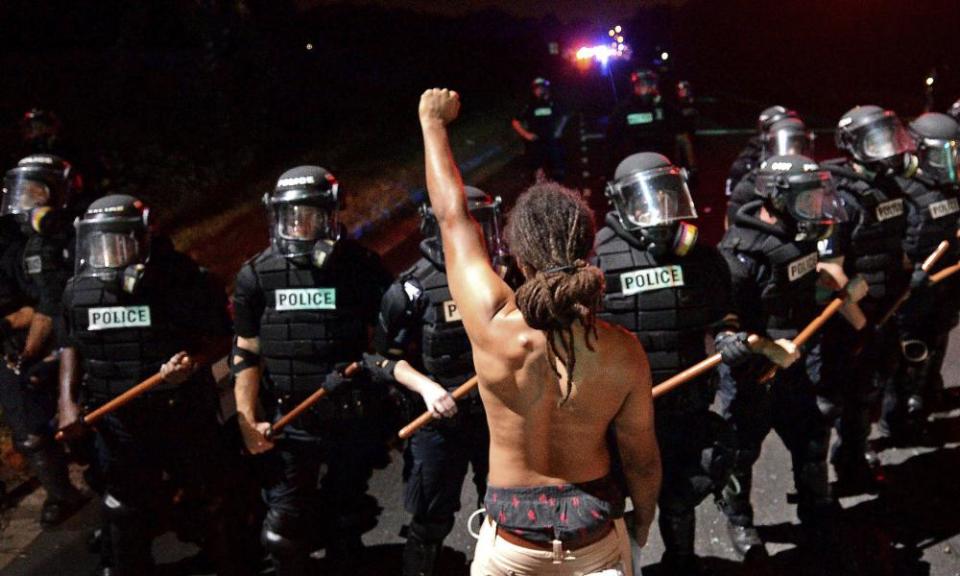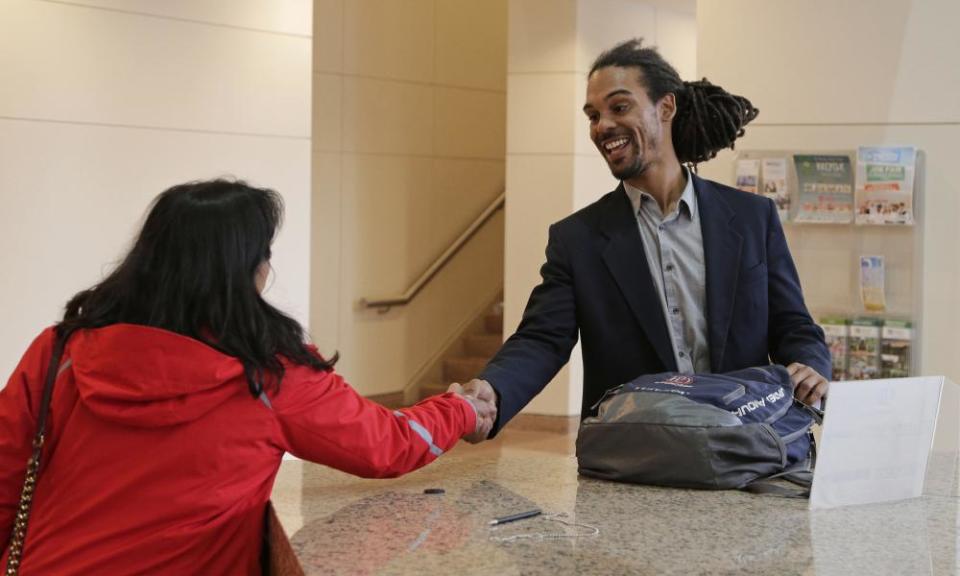His act of defiance went viral. Now elected, Braxton Winston aims to fix the system from within
His clenched-fist salute to riot police became an emblematic image – now ‘It will be interesting to see what happens when the dog actually catches the car’

One of the newest faces of politics in Trump-era America is a man who became a prominent activist after a police shooting in his town and a snapshot that went viral.
Braxton Winston was voted on to the city council in Charlotte in the local and state elections held earlier this month.
“It will be interesting to see what happens when the dog actually catches the car,” he told the Guardian.
His elevation to newly elected official came a little more than a year after he was arrested during demonstrations in the North Carolina city to protest about the death of resident Keith Scott at the hands of the police.
At one point during several days of volatile demonstrations in 2016, Winston stood shirtless in front of riot police, at the front of a crowd of protesters, and raised a clenched-fist salute. He had taken off his shirt to use as a mask against the clouds of teargas he says police had been firing “for hours”.
A photographer for the Charlotte Observer newspaper snapped a picture of Winston from the back, and the striking image lit up the internet.
“That was a snapshot of a moment. That was the first night of many long nights out on the street,” he said of the photograph.
He recalled it was a “high adrenaline” protest, where he was overwhelmed by teargas but still wanted to make a point while maintaining his composure, he said.
“I know that the fist does make a statement, it allows me to say everything I want to say,” he said.
Since his election, Chelsea Clinton and rapper and activist Common have both sung his praises on social media.
In a pointed tweet aimed at Donald Trump, Clinton said: “Mr. President, @BraxtonWinston is a superb example of an actual ‘very fine’ person. And, yes I know he won an election in Charlotte, not Charlottesville. Still, please learn more about him.”
She was referring to Trump’s remarks in the aftermath of a huge white supremacist rally in Charlottesville, Virginia, in August, when despite Nazi-style regalia and chanting and a peaceful anti-discrimination demonstrator being killed, the president said there were “very fine people on both sides”.
Common, the hip-hop artist and civil, animal and gay rights activist, also known as Lonnie Rashid Lynn, also wrote on Twitter.
“Inspiring: this photo was taken at a protest following the killing of Keith Lamont Scott in Charlotte,” he tweeted, above the picture of Winston confronting the police. “The brother in the photo with his hand raised is @BraxtonWinston. On Tuesday, he won a seat on the Charlotte City Council!!”

As a member of the council, Winston will now have a level of influence over the Charlotte-Mecklenburg police department, whose officers had arrested him the year before and whose chief, Kerr Putney, he called on to be fired at the time.
Keith Scott was shot dead after police say he failed to drop a gun upon their order. The officer who shot him was not charged. The victim, officer and police chief were all African American, but although the death did not prompt the same level of tension over race relations that has followed other recent killings of young black men by white police officers, parts of Charlotte erupted.
“It was not just anti-police-brutality, it was about the inequities – this is one of the most segregated cities in the world,” said Winston.
He was hit in the shoulder by a teargas canister shot out of a cannon and absorbed so much gas that he feared for his life at certain points, he said. “It was close to a war zone,” he recalled.
Having since sat down with Putney for several discussions, Winston is no longer calling for the police chief’s removal from office. “That’s old news,” he said.
Charlotte had not experienced the level of demonstrations that had swept many other cities with the rise to national prominence of the Black Lives Matter movement and race relations issues following the shootings of Trayvon Martin by security patrolman George Zimmerman in Florida in 2014 and Michael Brown by a white police officer in Missouri in 2015.
So when angry protests flared up after Scott’s death, “there was a lack of leadership,” Winston said, which led to “both police officers and protesters being in danger”, he said. But firing the police chief would not necessarily have helped, he said, “with hindsight”.
“I’d rather figure out how to fix the system,” he said.
Winston, 34 and a professional videographer, had not been a prominent activist before, but found himself taking on a leading role after the demonstrations last September, which eventually turned into a run for office. Charges against him after his arrest were dropped, as was a lawsuit he filed against the city.
Last week he was part of a surge of diverse and progressive new leaders elected as Democrats by voters across the country on 7 November.
Charlotte also elected Vi Lyles to be mayor, the first African American woman to hold the office in the city.
Winston campaigned on a platform of criminal justice reform and better equality of opportunity in Charlotte. He described himself as a capitalist but is concerned that many lower-income residents are being forced out of their homes by gentrification amid soaring house prices and rents, and that an inadequate transportation system leaves poorer communities isolated from the center of the city.
“There are pockets of extreme poverty next to extreme wealth,” he said. “It’s my job to have uncomfortable conversations, be an agent of change and get the work done now.”

